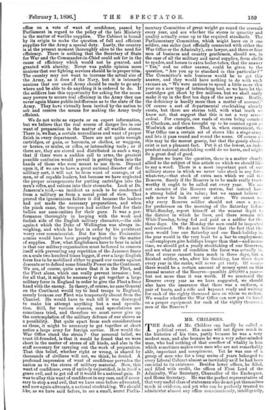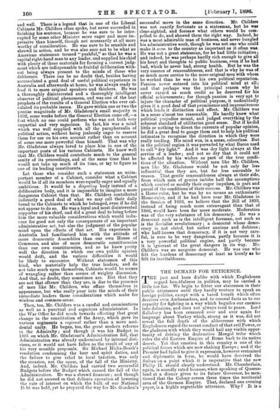MR. CHILDERS. and well. There is a legend that in
one of the Liberal Cabinets Mr. Childers often spoke, but never succeeded in finishing his sentence, because he was sure to be inter- rupted by some other Minister more eager and more im- pressive than himself, though not necessarily at all more worthy of consideration. He was sure to be sensible and shrewd in action, and he was also sure not to be what an American statesman termed " pushful," so that he was a capital right-hand man to any leader, and. supplied his chief with plenty of those materials for forming a correct judg- ment which are indispensable to fruitful deliberation with- out being always present to the minds of those who deliberate. There can be no doubt that, besides having accumulated a, good. deal of useful political experience in Australia and afterwards at home, he was always ready to lend it to more original speakers and thinkers. He was a, thoroughly disinterested and a thoroughly intelligent observer of political phenomena, and was one of the best prophets of the results of a General Election who ever cal- culated its probable issues. He gave within one or two the precise magnitude of Mr. Gladstone's small majority in 1892, some weeks before the General Election came off,—a feat which no one could perform who was not both very impartial and very sagacious. In fact, his was a mind which was well supplied with all the paraphernalia of political action, without being jealously eager to reserve them for use on his own account rather than on account of some one more powerful than himself. That was why Mr. Gladstone always loved to place him in one of the important posts of his various Cabinets. He knew well that Mr. Childers would contribute much to the general sanity of its proceedings, and at the same time that he would not take up much of its time, or try to figure as one of its leading constituents.
Let those who consider such a statesman an unim- portant member of a Cabinet, consider what a Cabinet would be if all its members were equally eager and equally ambitious. It would be a disputing body instead of a deliberative body, and it is impossible to imagine a more dangerous Cabinet than that. Mr. Childers contributed indirectly a good deal of what we may call their daily bread to the Cabinets to which he belonged, even if he did not appear to do so. He was a loyal and most disinterested supporter of his chief, and did a great deal to bring before him the more valuable considerations which would influ- ence for good not only the consequences of an important administrative act, but also the judgment of the popular mind upon the effects of that act. His experience in Australia had familiarised him with the attitude of more democratic Assemblies than our own House of Commons, and also of more democratic constituencies than our own constituencies, and so he knew pretty well the direction in which our own public opinion would drift, and the various difficulties it would be likely to encounter. Without statesmen of this kind, who materially help the true leaders, and do not take much upon themselves, Cabinets would be scenes of wrangling rather than scenes of weighty discussion. And that, no doubt, they sometimes are. But that they are not that oftener than they are, is due to the presence of men like Mr. Childers, who efface themselves in appearance, but who really pour into the minds of their immediate leaders those considerations which make for wisdom and common-sense.
Then, too, Mr. Childers was a careful and conscientious as well as a punctual and sagacious administrator. In the War Office he did much towards effecting that great change in the constitution of the Army, which gave its various regiments a regional rather than a mere acci- dental unity. He began, too, the great modern reforms in the Admiralty ; and though it was his Budget in 1885 on which Mr. Gladstone's Administration fell, that Administration was already undermined by internal divi- sions, or it would not have fallen as the result of any of his very sensible proposals. Sir Michael Hicks-Beach's resolution condemning the beer and spirit duties, and the failure to give relief to local taxation, was only the occasion, not the cause, of the fall of the Ministry. And, indeed, Mr. Childers had carried two successful Budgets before the Budget which caused the fall of the Administration. He was a shrewd financier ; and though he did not succeed in that delicate operation of lowering the rate of interest on which the bulk of our National bt was held, yet he prepared the way for Mr. Goschen's successful move in the same direction. Mr. Childers was not exactly fortunate as a statesman, but be VIA clear-sighted, and foresaw what others would be com- pelled to do, and showed them the right way. Indeed, he was a most admirable man of business, and never bungled his administrative work, though he was not one who could make it seem to the country as important as it often MIL He was not a great statesman, for he had little initiative ; and indeed, he was perhaps hardly rich enough to give all his heart and thoughts to public business, even if he had had, which he never had, strong health. But he was the very essence of reasonableness, and that is why he was of so much more service to the more original men with whom he worked than he was to his own political reputation. Passion never entered into his political mind at all; and that perhaps was the principal reason why he never earned as much credit as he deserved for his official achievements ; for though passion is very apt to injure the character of political purpose, it undoubtedly gives it a good deal of that prominence and impressiveness which lends it distinction and effect. Mr. Childers was in a sense almost too reasonable. He hardly knew what political prejudice meant, and judged everything by the soberest standard of utilitarian good sense. But if he did little or nothing to direct the currents of popular opinion, he did a great deal to gauge them and to help his political intimates to recognise the direction in which they were really tending. His mind was, in a sense, colourless. But in the political region it was pervaded by what Bacon used to call "dry light." And it was dry light always at the service of a leader ; and not so dry that it could not be affected by his wishes as part of the true condi- tions of the situation. Without men like Mr. Childers, men like Mr. Gladstone would be not only far less influential than they are, but far less amenable to reason. That gentle reasonableness always at their side, from which men of genius imbibe half the assumptions which control or modify their eager impulses, is part and Parcel of the conditions of their success. Mr. Childers was a Home-ruler, but he was by no means an enthusiastic Home-ruler, and if he had been near Mr. Gladstone in the Session of 1893, we believe that the Bill of 1893, instead of being much more extravagant than that of 1886, would have been far more moderate. Moderation was of the very substance of his democracy. He was a democrat such as is the intelligent foreman, not such as is the Socialist revolutionary ; a democrat whose demo- cracy is not elated, but rather anxious and dubious ; who half-knows that democracy, if it is not very care- ful, is sure to be very dangerous, partly because it is a very powerful political engine, and partly because it is ignorant of the great dangers in its way. Mr. Childers was no sanguine democrat. He was one who felt the burdens of democracy at least as keenly as he felt its inevitableness.







































 Previous page
Previous page